Coffee Basics
How to Work a Mr Coffee Espresso Machine

Hey there, coffee enthusiasts!
We’ve all been there – craving a delicious cup of espresso but not sure how to work that fancy Mr Coffee espresso machine. Well, fear not! We’ve got you covered with this detailed, step-by-step guide on how to master that machine like a true barista.
From unboxing and setup to brewing, frothing, and cleaning, we’ll walk you through every essential technique.
So grab your favorite mug, because it’s time to serve up some seriously satisfying espresso!

Key Takeaways
- Properly unbox and clean the espresso machine before use
- Choose the right coffee beans and adjust the grind size for optimal extraction
- Master the process of brewing espresso by properly setting up the machine and ensuring even distribution of coffee grounds
- Learn how to froth and steam milk to achieve silky smooth texture
Unboxing and Setup
First, we unbox the Mr Coffee Espresso Machine and proceed with the setup process. The first step is to carefully remove the machine from its packaging, ensuring not to damage any of the components. Before plugging it in, we recommend thoroughly cleaning the machine to remove any dust or residue.
Next, fill the water reservoir with fresh, cold water and ensure it’s properly seated in its place. Now, it’s time to power on the machine and allow it to heat up. While waiting for it to reach the optimal temperature, familiarize yourself with the different buttons and settings.
If you encounter any common troubleshooting issues, such as a clogged filter or uneven extraction, refer to the user manual for tips and tricks. Once the machine is ready, we can move on to preparing the espresso.
Preparing the Espresso Machine
To continue, let’s prepare the espresso machine by checking the coffee grounds and adjusting the grind size if needed. Understanding espresso extraction is crucial in achieving a perfect shot of espresso. It’s important to choose the right coffee beans for your espresso machine, as they greatly impact the flavor and aroma of your coffee. Look for beans that are specifically labeled as espresso beans, as they’re typically roasted darker and have a more robust flavor profile.

When preparing the machine, ensure that the coffee grounds are evenly distributed and not too tightly packed. Adjust the grind size according to the desired extraction time and flavor intensity.
Now that the espresso machine is properly prepared, we can move on to brewing the perfect cup of espresso.
Brewing Your Espresso
Now, let’s begin brewing our espresso using the Mr Coffee Espresso Machine. To start, ensure that the machine is properly set up and the water reservoir is filled.
Next, select the desired amount of coffee grounds and fill the portafilter, making sure to distribute the grounds evenly. Attach the portafilter to the machine and initiate the brewing process.

The machine will begin extracting the espresso shot, which should take approximately 20-30 seconds. Keep an eye on the espresso as it flows, aiming for a steady stream of dark, rich liquid.
If you encounter any issues, such as a slow extraction or uneven flow, try adjusting the grind size or tamping pressure. Troubleshooting common brewing issues is crucial to consistently achieving a perfect espresso shot.
In the next section, we’ll delve into the art of frothing and steaming milk to complete your espresso-based beverages.
Frothing and Steaming Milk
To froth and steam milk using the Mr Coffee Espresso Machine, we’ll now explore the proper techniques and steps involved. Here are some tips and tricks to achieve the perfect milk foam:

- Start by selecting the right type of milk for frothing. Whole milk produces a creamy and rich foam, while skim milk creates a lighter foam. Experiment with different milk options to find your preferred taste and texture.
- Pour cold milk into a stainless steel pitcher, filling it up to about one-third of its capacity. This allows room for expansion during the frothing process.
- Position the steam wand of the espresso machine just below the surface of the milk, at a slight angle. Turn on the steam function and allow the steam to incorporate air into the milk, creating a velvety foam.
- Keep the steam wand submerged as the milk heats up. The ideal temperature for silky smooth milk is around 150°F.
- Once the desired temperature is reached, turn off the steam and wipe the wand with a damp cloth to remove any milk residue.
By following these steps, you’ll be able to create a delicious and visually appealing milk foam to enhance your espresso experience.
Now, let’s move on to the next section about cleaning and maintenance, so you can keep your Mr Coffee Espresso Machine in top shape.
Cleaning and Maintenance
Moving on to the topic of cleaning and maintenance, let’s explore how to properly care for your Mr Coffee Espresso Machine. Regular cleaning and maintenance are essential to ensure the longevity and optimal performance of your machine. One important aspect of maintenance is the descaling process, which helps remove mineral deposits and build-up that can affect the taste and functionality of your espresso machine. It is recommended to descale your machine every three months or as needed. To troubleshoot common issues, refer to the table below:
| Common Issues | Troubleshooting |
|---|---|
| Machine not turning on | Check power source and ensure the machine is properly plugged in |
| Weak espresso | Adjust grind size and ensure proper tampering |
| Leaking water | Check for loose or damaged parts, such as the water tank or gaskets |
| No steam or froth | Ensure the machine has reached the appropriate temperature and check the steam wand for blockages |
| Noisy operation | Clean and lubricate moving parts, such as the brew head and portafilter |
Frequently Asked Questions
How Long Does It Take for the Mr Coffee Espresso Machine to Heat up Before It’s Ready to Brew?
It takes a few minutes for the Mr Coffee espresso machine to heat up before it’s ready to brew. To ensure optimal performance, it’s important to clean and maintain the machine regularly. Troubleshooting common issues can also help in maintaining its functionality.
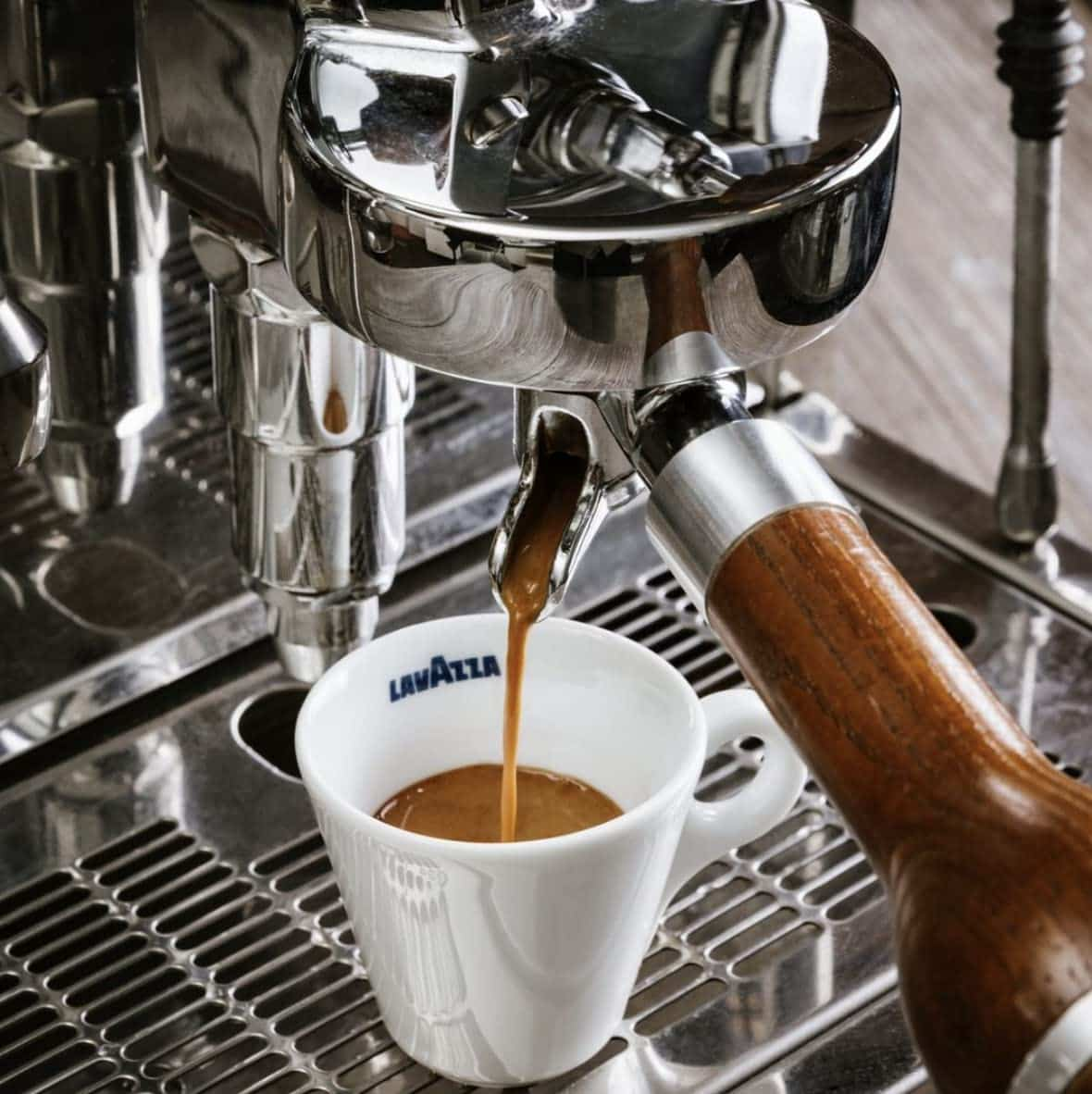
Can I Use Any Type of Coffee Beans or Do I Need Special Espresso Beans?
When considering which beans to use, it’s important to choose coffee beans specifically labeled for espresso. While regular coffee beans may be tempting, espresso beans are finely ground and roasted to perfection for optimal flavor extraction in an espresso machine.
What Is the Ideal Temperature for Steaming Milk With the Mr Coffee Espresso Machine?
The ideal temperature for steaming milk with the Mr Coffee Espresso Machine is around 150-155 degrees Fahrenheit. To achieve this, make sure to use cold milk and position the steam wand just below the surface, creating a whirlpool effect for perfect froth.
Is It Possible to Adjust the Strength of the Espresso Shot?
Yes, it is possible to adjust the strength of the espresso shot with the Mr Coffee Espresso Machine. There are different types of espresso shots, and by adjusting the grind size and amount of coffee, you can customize the strength to your liking.
Can I Leave the Mr Coffee Espresso Machine Plugged in All the Time or Should I Unplug It When Not in Use?
Yes, you can leave the Mr Coffee Espresso Machine plugged in all the time. However, it is recommended to unplug it when not in use to avoid potential safety concerns.

Conclusion
In conclusion, working a Mr. Coffee espresso machine is a simple and enjoyable process.
By following the unboxing and setup instructions, preparing the machine, brewing your espresso, frothing and steaming milk, and performing regular cleaning and maintenance, you can consistently create delicious cups of espresso.
With its detailed and informative features, this espresso machine is sure to enhance your coffee experience.
So, start brewing and enjoy your homemade espresso today!

Justin is a seasoned author, coffee and tea enthusiast, and an essential member of the Cappuccino Oracle team. With a keen appreciation for the complexities of coffee, coffee alternatives, and tea, Justin has dedicated his professional career to exploring these realms and sharing his insights with readers worldwide.
Justin’s immersion in the world of coffee, coffee alternatives, and tea began at a young age, kindling a passion that extended beyond mere consumption. This love for these beverages led him to combine his talent for writing with his devotion to coffee and tea, bringing him to Cappuccino Oracle as a dedicated author.
Coffee Basics
Coffee and Intermittent Fasting: What You Need to Know
Not only can coffee enhance your intermittent fasting experience, but it also offers surprising benefits that you won’t want to miss discovering!

If you're into intermittent fasting, black coffee can be your best friend. It's nearly calorie-free, so it won't break your fast, and it helps boost your metabolism while promoting fat oxidation. Drinking 1-2 cups can also increase alertness and improve mood, thanks to its caffeine content. Just remember to skip the milk and sugar, as additives can mess with your fasting benefits. Moderation is key—stick to about four cups a day to avoid any jitters. Want to discover more about integrating coffee into your fasting routine? There's plenty more to explore!
Key Takeaways
- Black coffee is ideal for intermittent fasting as it is nearly calorie-free and won't break your fast.
- Consuming 1-2 cups of black coffee can boost metabolism and enhance fat oxidation during fasting.
- Additives like milk or sugar should be avoided to maintain the fasting benefits of black coffee.
- Regular coffee consumption is linked to improved cognitive function, mood, and lower risks of chronic diseases.
- Moderation is key; excessive caffeine intake can lead to negative health effects and disrupt sleep patterns.
Understanding Intermittent Fasting

Understanding intermittent fasting can be a game-changer for your eating habits. This eating pattern alternates between fasting periods and eating, focusing more on when you eat rather than what you consume. You might find methods like time-restricted eating useful, such as the popular 16/8 method, where you fast for 16 hours and eat during an 8-hour window.
Incorporating health benefits of coffee during your eating periods may enhance your overall experience. During your fasting periods, you can only consume low-calorie beverages like water, black coffee, or tea. This restriction helps your body enter a state that can promote weight loss and improve insulin sensitivity.
Many people experience notable health benefits from intermittent fasting, including reduced risks of chronic diseases like heart disease and type 2 diabetes.
The flexibility of intermittent fasting allows you to tailor your approach to fit your lifestyle and preferences. Whether you choose alternate-day fasting or stick to a time-restricted eating plan, you can adapt it to meet your needs.
With so many options available, you can embrace intermittent fasting as a versatile and effective strategy for enhancing your overall health.
Coffee Consumption During Fasting

During intermittent fasting, coffee can be a valuable ally. Black coffee is nearly calorie-free, making it an ideal beverage that won't break your fast. With numerous varieties available, including single-origin and blends, you can explore different flavors while enjoying your coffee.
When you drink 1-2 cups of black coffee, you can enhance your metabolic rate and promote fat oxidation while enjoying appetite suppression, which helps you stick to your fasting schedule. Coffee varieties can excite your taste buds and provide a satisfying experience.
It's essential to avoid high-calorie additives like milk or sugar, as they can disrupt the benefits of fasting. Sticking to black coffee or using minimal low-calorie options is the way to go.
Regular coffee consumption during fasting not only keeps you energized but also offers health benefits, such as improved brain function and reduced inflammation.
Caffeine, present in coffee, is generally safe in moderation—up to 400 mg per day, or about four cups, is acceptable for most individuals.
Health Benefits of Coffee

When you enjoy your daily cup of coffee, you're not just savoring its rich flavor; you're also boosting your cognitive function and overall health.
Coffee can evoke feelings of joy and nostalgia, much like a heartwarming song, and with its powerful antioxidants, it helps protect your body against diseases while reducing inflammation.
Plus, regular consumption is linked to a lower risk of conditions like heart disease and Type 2 diabetes, making it a smart choice for your well-being.
For those looking for a radiant start to their day, coffee can be as uplifting as Blue Skies and Lemonade, making it an ideal companion for your health journey.
Cognitive Function Enhancement
Coffee's remarkable ability to enhance cognitive function has made it a favorite among many seeking a mental boost. The caffeine in coffee blocks adenosine, a neurotransmitter that promotes sleep, which increases your alertness and focus. As a result, you might find that your memory and learning capabilities improve considerably. Regular coffee drinkers often report better information retention and recall, which can be particularly beneficial during fasting periods when mental clarity is essential.
Research shows that a daily intake of 3-5 cups of coffee may lower the risk of neurodegenerative diseases like Alzheimer's and Parkinson's. This protective effect against cognitive decline suggests that coffee can be part of a healthy lifestyle aimed at maintaining brain health as you age.
| Benefit | Details |
|---|---|
| Enhanced Cognitive Function | Caffeine boosts alertness and improves focus. |
| Improved Memory | Regular consumption helps with information retention. |
| Reduced Disease Risk | May lower the risk of neurodegenerative diseases. |
Incorporating coffee into your daily routine might just give you the edge you need for ideal cognitive performance.
Antioxidant Properties Benefits
Many people don't realize that coffee is a powerhouse of antioxidants, which can considerably benefit your health. These antioxidants help neutralize free radicals, reducing oxidative stress in your body and potentially lowering the risk of chronic diseases.
Regular coffee consumption can be particularly advantageous for several reasons, and like cranberry juice, it may also provide protective effects against certain health issues, according to studies on antioxidant consumption.
- It may decrease the risk of Type 2 diabetes.
- It's linked to a lower risk of heart disease.
- It supports liver health, with coffee drinkers showing improved liver enzyme levels.
- Antioxidants in coffee can enhance cognitive function.
- There's evidence suggesting a reduced risk of neurodegenerative diseases like Alzheimer's and Parkinson's.
The antioxidants in coffee, such as chlorogenic acid and caffeic acid, boast anti-inflammatory properties, contributing to your overall health.
By incorporating coffee into your routine, you're not only enjoying a delicious beverage but also bolstering your defenses against oxidative stress and its associated risks.
Disease Risk Reduction
Numerous studies reveal that regular coffee consumption can considerably reduce your risk of various diseases. By incorporating coffee into your daily routine, you might enjoy protective health benefits while also benefiting from the health benefits of fasting. Research shows that moderate coffee intake—up to three cups daily—can lower your risk of heart disease mortality by 19%.
Moreover, higher coffee consumption is associated with a decreased likelihood of developing Type 2 diabetes, suggesting that coffee drinkers experience a lower incidence of this condition. The rich antioxidants found in coffee help combat oxidative stress and inflammation, which may contribute to reducing disease risk.
Additionally, drinking coffee has been linked to a reduced risk of neurodegenerative diseases, such as Alzheimer's and Parkinson's, promoting better cognitive health. It also offers protective health benefits against liver diseases, including liver cirrhosis.
Here's a quick overview of coffee's health benefits:
| Disease/Condition | Coffee's Impact | Benefit Type |
|---|---|---|
| Heart Disease | 19% reduced mortality risk | Protective Health |
| Type 2 Diabetes | Lower incidence | Protective Health |
| Neurodegenerative Diseases | Decreased risk | Cognitive Protection |
| Liver Diseases | Reduced risk | Protective Health |
| Oxidative Stress | Antioxidant-rich | Overall Health Benefits |
Effects of Additives in Coffee

When you add ingredients like milk, cream, or sugar to your coffee, you might be sabotaging your fasting efforts.
Even a small amount can disrupt the calorie restrictions that help you reap the benefits of intermittent fasting.
Additionally, understanding your budget for food and drink can aid in making healthier choices during fasting periods.
To stay on track with your goals, it's crucial to monitor and limit these additives carefully.
Caloric Impact of Additives
The caloric impact of additives in coffee can be surprising, especially if you're trying to maintain a fasting regimen. High-calorie additives like milk and sugar can greatly increase the caloric content of your coffee, potentially disrupting the fasting process.
Even small amounts can affect your insulin levels, so it's vital to keep your coffee black during fasting periods. Additionally, being mindful of your environment can enhance overall wellness, similar to how ensuring proper airflow around an air purifier improves its performance air purifier maintenance tips.
Here are some key points to take into account:
- High-calorie additives (like milk or sugar) can break a fast.
- Popular drinks (such as lattes and flavored coffees) often contain excessive calories.
- Minimal amounts (like 1 teaspoon of heavy cream) may not greatly affect fasting but aren't ideal.
- Zero-calorie beverages are the best choice for maintaining fasting integrity.
- Monitoring additives in coffee is essential for your fasting goals.
To optimize your intermittent fasting experience, stick to black coffee. This way, you won't unintentionally consume calories that could disrupt your fasting process.
Fasting Benefits Preservation
Maintaining the benefits of intermittent fasting hinges on more than just meal timing; it also involves what you consume during fasting periods. When you opt for black coffee, you keep your caloric intake to a minimum—around 3 calories per 240 ml. This choice supports fasting benefits because it doesn't trigger notable metabolic changes that could disrupt your fasting state.
Additionally, consider the impact of essential oils for enhancing your overall well-being during fasting, such as essential oils for respiratory health that can help alleviate discomfort.
However, be cautious with additives. High-calorie options like milk and sugar can considerably increase your caloric intake, potentially breaking your fast. Even a small amount can counteract your fasting efforts. Low-calorie options, such as a teaspoon of heavy cream, are less impactful but should still be used sparingly to maintain fasting integrity.
It's vital to avoid flavored coffee drinks during your fasting periods, as they're typically high in calories and sugar. Monitoring and limiting additives is key to preserving the fasting benefits you seek.
Caffeine Considerations

Here are key points to keep in mind:
– Moderation is essential: Aim for up to 400 mg of caffeine daily to avoid side effects.
Additionally, consider the impact of caffeine on cold medications, as it may interact with certain drugs.
- Watch for side effects: Excessive caffeine can lead to heart palpitations and increased blood pressure.
- Monitor your insulin sensitivity: High caffeine intake might raise fasting insulin levels, so balance is vital.
- Be mindful of sleep patterns: Consuming caffeine late in the day can disrupt your sleep, affecting your overall health and fasting benefits.
- Understand individual responses: Everyone's tolerance differs; adjust your caffeine consumption based on how your body reacts.
Enhancing Fasting Benefits

Incorporating black coffee into your intermittent fasting routine can greatly amplify its benefits. During your fasting period, black coffee can enhance fat oxidation, potentially increasing your metabolic rate, which aids in weight loss efforts. The caffeine in coffee is known for its role in appetite suppression, making it easier for you to adhere to your fasting protocols. This is similar to how energy-saving features in heat pumps help optimize efficiency while reducing consumption.
While scientific evidence on appetite suppression is limited, many people find that a cup of black coffee helps curb cravings.
Moreover, regular coffee consumption is linked to reduced inflammation, complementing the benefits of intermittent fasting and promoting overall health. You may also experience improved cognitive function and mood during fasting periods, as coffee can provide the mental clarity and focus needed to stick to your fasting goals.
Additionally, black coffee is rich in antioxidants, which can further enhance the health benefits of intermittent fasting. These antioxidants not only contribute to improved longevity but also help in reducing the risk of chronic diseases.
Risks and Precautions

Maneuvering the landscape of intermittent fasting requires awareness of the risks and precautions associated with coffee consumption. While caffeine can offer benefits, such as improving focus and energy, excessive intake can lead to unwanted side effects that may hinder your fasting success and overall well-being.
Here are some key points to keep in mind:
- Moderation is essential: Too much caffeine can cause heart palpitations and increased blood pressure.
- Monitor personal tolerance: Individual responses to caffeine vary, so pay attention to how it affects you. For instance, those who practice yoga might find that certain techniques help mitigate anxiety caused by caffeine.
- Consult healthcare professionals: If you have health conditions like anxiety or heart issues, check with your doctor before drinking coffee during fasting.
- Be mindful of sleep: Consuming caffeine later in the day may disrupt your sleep patterns, affecting your fasting adherence.
- Watch for adjustment symptoms: Newcomers to intermittent fasting might face fatigue or headaches, which can worsen with high caffeine intake.
Personalized Approaches to Fasting

Understanding the risks and precautions of coffee consumption during intermittent fasting sets the stage for adopting a personalized approach to your fasting routine.
Intermittent fasting isn't one-size-fits-all, and you might find various schedules like 16/8, 18/6, or 5:2 more suitable for your lifestyle and goals. Your individual responses to fasting can be influenced by factors like age, gender, and metabolic health.
For instance, women often experience different metabolic responses due to hormonal fluctuations, making it essential to tailor your fasting plan according to your menstrual cycle. Gradually introducing fasting periods can help you assess your tolerance and adjust your eating patterns comfortably.
Don't hesitate to consult healthcare professionals for personalized fasting advice, especially if you have underlying health conditions or are considering significant dietary changes.
Frequently Asked Questions
What Is the Rule for Coffee During Intermittent Fasting?
When you're intermittent fasting, you can enjoy black coffee without worrying about calories. Just skip any high-calorie additives like milk or sugar, as they can break your fast and hinder your goals.
What Can I Put in My Coffee That Won't Break My Fast?
You can add zero-calorie sweeteners, like stevia, or spices such as cinnamon to your coffee without breaking your fast. Just avoid high-calorie ingredients like milk, cream, or sugar to maintain your fasting benefits.
Why Is 16 Hours the Magic Number for Fasting?
The 16-hour fasting window's ideal because it aligns with your body's natural rhythms, enhances fat burning, promotes cellular repair, and improves metabolic health. This balance helps you achieve better overall health and weight management.
What Happens if You Only Drink Coffee and Don't Eat?
If you sip only coffee, you're dancing on a razor's edge. You might lose weight at first, but fatigue and irritability could soon crash the party, leaving you nutrient-depleted and craving balance.
Conclusion
In the journey of intermittent fasting, think of coffee as your trusty compass. It can guide you through those long fasting hours, keeping your energy up and cravings at bay. Just like a sailor relies on their compass to navigate stormy seas, you can rely on coffee to enhance your fasting experience. But remember, it's important to listen to your body and adjust as needed. With the right balance, you'll find your way to better health and well-being.
In the vast and diverse world of coffee, coffee alternatives, and tea, Olivia has found her calling. As an author and a dedicated coffee and tea aficionado, her work for Cappuccino Oracle reflects her profound love and understanding of the intricate complexities found within these beverages. Olivia’s passion for the subject serves as both a catalyst for her creativity and a connection point with her audience.
Olivia’s appreciation for coffee, coffee alternatives, and tea blossomed at an early age. She discovered that these beverages invigorated her senses and stimulated her creative spirit. From the nuanced flavors of single-origin roasts to the captivating narratives intertwined with coffee, coffee alternatives, and tea trade and culture, Olivia found an unlimited source of inspiration in her daily cup.
Her love for these beverages and her talent for storytelling eventually converged at Cappuccino Oracle. As an author, Olivia’s mission is to illuminate the intricate tapestry that makes up the world of coffee, coffee alternatives, and tea. Her articles span a diverse range of topics, encompassing everything from the unique flavors of different brews to the sociocultural history intertwined with their cultivation and consumption.
Coffee Basics
The Gut-Coffee Connection: How Your Daily Cup Affects Digestive Health
Find out how your daily cup of coffee impacts your digestive health and discover surprising effects that could change your morning routine forever.

Your daily cup of coffee can greatly affect your digestive health. It stimulates gastric acid production, which helps digest food but might irritate sensitive stomachs. Drinking moderate amounts—around 1 to 3 cups daily—can enhance gut motility and even promote the growth of beneficial bacteria like Bifidobacteria. However, if you have conditions such as IBS or GERD, coffee might exacerbate your symptoms. Choosing low-acid or dark roasts can lessen discomfort. Staying hydrated and pairing coffee with high-fiber foods can support digestion too. There's much more to discover about how coffee interacts with your gut health.
Key Takeaways
- Moderate coffee consumption can stimulate gastric acid secretion, aiding digestion and improving bowel motility for many individuals.
- Antioxidants in coffee, particularly chlorogenic acids, promote gut health by reducing inflammation and improving digestive efficiency.
- Regular coffee intake enhances the growth of beneficial bacteria like Bifidobacteria, supporting a diverse gut microbiota and aiding nutrient absorption.
- Coffee may exacerbate symptoms for individuals with conditions like IBS or GERD, leading to digestive discomfort.
- Staying hydrated and consuming high-fiber foods alongside coffee can optimize its digestive health benefits while minimizing potential side effects.
Historical Significance of Coffee

The historical significance of coffee stretches back to the 15th century when an Ethiopian goat herder first noticed its energizing effects on his goats. This discovery marked the beginning of a beverage that would evolve into a cultural staple across various societies.
Coffee comes from the harvested berries of Coffea plants, which undergo processing methods like wet or dry processing before they're roasted and ground into your daily cup. Over time, various brewing methods, such as the French press and espresso, have emerged, each contributing to the unique experience of enjoying coffee and its varied caffeine levels.
In many cultures, coffee was more than just a drink; it played a crucial role in social interactions and rituals. Monks used coffee to stay awake during long prayer sessions, highlighting its function in enhancing alertness and focus.
Yet, coffee's stimulating properties rendered it a controversial drink in some regions, leading to temporary bans. Despite this, it found its way into the hearts (and hands) of many, becoming an integral part of daily life.
With its rich history, coffee has transcended its origins, influencing societies and cultures worldwide. Its journey from Ethiopian goats to global coffeehouses showcases not only its energizing effects but also its enduring place in human connection.
Coffee's Effects on Digestion
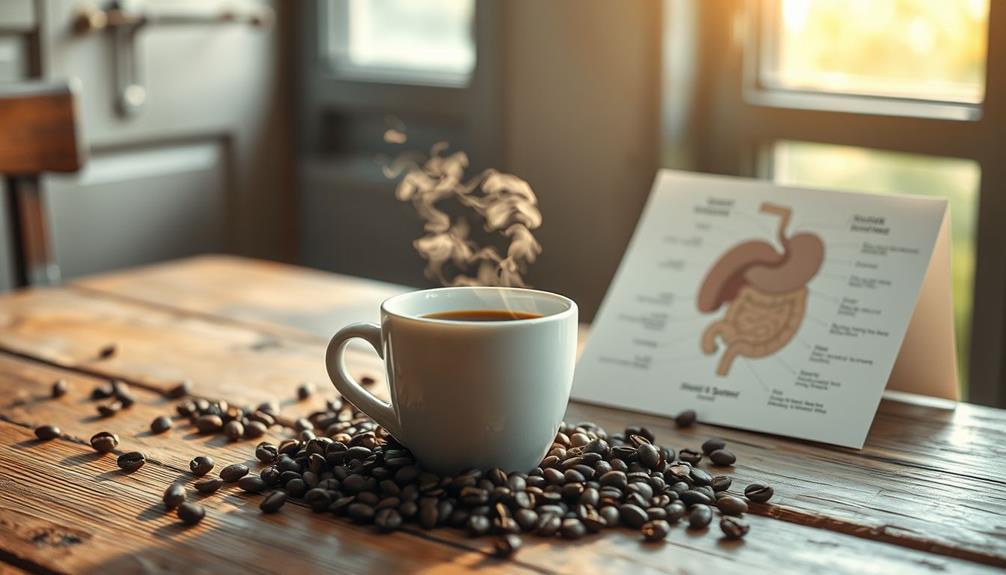
Coffee can have a significant impact on your digestion, both positively and negatively. Regular coffee consumption stimulates gastric acid secretion, which can aid digestion but might also cause discomfort like heartburn or diarrhea, especially in sensitive individuals.
Coffee varieties and preparation techniques can influence how your body reacts to caffeine. If you enjoy moderate consumption of up to three cups daily, you may experience improved bowel motility and relief from constipation. However, the acidity in coffee can irritate your stomach lining and exacerbate gastrointestinal disorders like gastroesophageal reflux disease (GERD) and gastritis.
Choosing dark roasted coffee can be beneficial, as it typically has lower acidity compared to lighter roasts, potentially reducing digestive discomfort. This choice can help you enjoy your favorite beverage without triggering heartburn.
Additionally, research indicates that regular coffee drinkers may experience positive changes in gut microbiota composition, promoting the growth of beneficial bacteria. This shift can enhance your overall digestive health, making coffee a double-edged sword.
While it can offer benefits, it's crucial to listen to your body and adjust your intake accordingly to avoid any adverse effects.
Benefits for Gut Health

When you enjoy your daily cup of coffee, you're not just savoring a rich flavor; you're also reaping benefits for your gut health.
Coffee's antioxidant properties can help reduce inflammation, while its ability to enhance gut motility can keep things moving smoothly.
Additionally, coffee may interact positively with other beverages, such as cranberry juice consumption, promoting overall digestive health.
Plus, regular consumption promotes the growth of beneficial bacteria, supporting a balanced microbiome.
Antioxidant Properties of Coffee
How does coffee, often celebrated for its rich flavor, also serve as a powerhouse of antioxidants that can benefit your gut health? Coffee is packed with antioxidants, particularly chlorogenic acids, which can greatly reduce oxidative stress and inflammation in your gastrointestinal tract.
This reduction in inflammation helps promote overall gut health, allowing your digestive system to function more efficiently. Additionally, essential oils for digestive support can complement coffee's benefits by promoting a healthy digestive environment.
Regular coffee consumption has been linked to an increase in beneficial bacteria, such as Bifidobacteria, which enhances microbiome diversity. A diverse microbiome is essential for peak digestive health, as it supports the balance of good bacteria in your gut.
Studies suggest that enjoying about 3.5 cups of coffee daily might even correlate with a 15% lower risk of death from all causes, partly due to its antioxidant properties that support gut health.
Additionally, the antioxidants in coffee may assist in recovery following gastrointestinal surgeries, further showcasing their role in improving digestive health.
Enhanced Gut Motility
A warm cup of coffee can do wonders for your gut motility, stimulating your intestines and helping alleviate constipation. Research shows that coffee consumption is linked to enhanced gastrointestinal activity, making it a great choice for those seeking constipation relief. The caffeine content plays a significant role in promoting bowel frequency, often leading to quicker waste elimination compared to just drinking water.
Here's a quick look at how coffee supports your digestive health:
| Aspect | Impact |
|---|---|
| Coffee Consumption | Increases gut motility |
| Caffeine Content | Boosts gastrointestinal activity |
| Antioxidants | Supports a healthy gut microbiome |
| Improved Bowel Function | Enhances recovery post-surgery |
Regular coffee drinkers often report improved bowel function, and studies suggest that moderate intake can lead to better gastrointestinal recovery. Plus, the antioxidants in coffee contribute to a healthier gut microbiome, further promoting digestive health. So, next time you reach for your cup, remember that your gut will likely thank you!
Beneficial Bacteria Growth
Coffee can really boost the growth of beneficial bacteria in your gut, playing an essential role in maintaining digestive health. Studies show that regular coffee consumption increases the levels of Bifidobacteria, a type of beneficial bacteria important for gut health. The chlorogenic acids in coffee actively promote the growth of these beneficial microbes while inhibiting harmful bacteria, enhancing your microbiome's overall balance.
In addition, incorporating natural remedies alongside your coffee intake can additionally support your digestive health. Moderate coffee intake also supports gastrointestinal recovery, helping your gut heal after surgery or illness. This recovery is essential for restoring function and ensuring your digestive system operates effectively.
Moreover, coffee drinkers tend to enjoy a more diverse gut microbiota, linked to better overall health outcomes and improved nutrient absorption.
One of the standout benefits of coffee is its anti-inflammatory properties, which help reduce gut inflammation. This creates a favorable environment for beneficial bacteria to thrive, making your gut healthier and more resilient.
Potential Risks and Side Effects
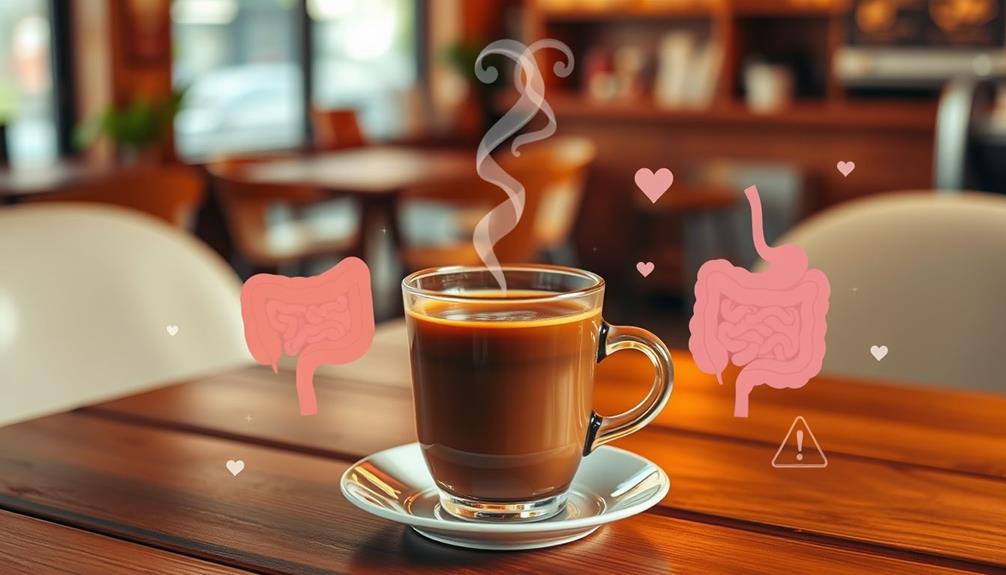
While coffee can offer some gut benefits, it's important to be aware of the potential risks it poses.
Individuals with conditions like Borderline Personality Disorder (BPD) may experience heightened emotional responses, which can further complicate their digestive health when consuming caffeinated beverages.
If you have conditions like irritable bowel syndrome or gastroesophageal reflux, coffee might worsen your symptoms.
Additionally, concerns about mycotoxin sensitivity could add another layer of complexity to your coffee consumption.
Irritable Bowel Syndrome Exacerbation
Exacerbation of Irritable Bowel Syndrome (IBS) can be a frustrating experience, especially when dietary choices come into play. If you're a coffee drinker, it's important to understand how coffee consumption might impact your symptoms.
The caffeine content in coffee can stimulate intestinal motility, potentially leading to loose stools or diarrhea, which are common issues for those with IBS. This can cause significant gastrointestinal discomfort and digestive disturbances that you'd rather avoid.
Additionally, ensuring a clean environment with ideal air quality can also contribute positively to your overall digestive health, as air purifiers can enhance indoor air quality.
Research shows that a substantial percentage of individuals with Inflammatory Bowel Disease (IBD) consume coffee, yet many report adverse effects. If you have IBS, be aware that coffee might alter your gut microbiota composition, further complicating your digestive health.
Monitoring your coffee intake is essential. Excessive consumption can exacerbate your symptoms, making it necessary to make personalized dietary choices tailored to your needs.
Heartburn and Gastroesophageal Reflux
For many people, enjoying a cup of coffee can quickly turn into a battle with heartburn and gastroesophageal reflux disease (GERD). Coffee consumption has been linked to increased gastric acid production, which may exacerbate symptoms of GERD in sensitive individuals. As a coffee drinker, you might experience symptoms like:
| Symptoms of GERD | Potential Causes |
|---|---|
| Heartburn | Increased gastric acid |
| Regurgitation | Stomach irritation |
| Dyspepsia | Coffee consumption |
While a 2014 meta-analysis showed no significant link between coffee and GERD, individual responses can vary greatly. Some studies suggest that coffee may worsen gastrointestinal discomfort, particularly for those with pre-existing conditions. If you have gastritis or other sensitive gastric issues, coffee might irritate your stomach lining, leading to uncomfortable symptoms.
It's vital to listen to your body. If you notice that your daily cup triggers heartburn or other GERD symptoms, consider adjusting your coffee consumption. Balancing your love for coffee with your digestive health is essential for long-term comfort.
Mycotoxin Sensitivity Concerns
Mycotoxin sensitivity can pose significant risks for coffee lovers, especially for those with a heightened reaction to mold. Mycotoxins are toxic compounds produced by certain molds that can contaminate coffee, potentially causing gastrointestinal discomfort.
While studies indicate harmful levels are rarely found in commercially available coffee, individuals sensitive to these toxins may still experience adverse effects when consuming varieties that haven't undergone mycotoxin testing. To support your investment in health, consider looking into brands with strong reputations for quality and safety, similar to the trusted reputation in the financial services sector found in the Gold IRA market.
To protect your digestive health, consider making informed dietary choices. Opting for organic coffee can help reduce exposure to mycotoxins, as these products often adhere to stricter regulations regarding mold contamination.
Additionally, selecting brands that conduct mycotoxin testing guarantees you're drinking coffee that's safer for your unique sensitivity.
It's essential to acknowledge that some coffee drinkers report gastrointestinal symptoms related to mycotoxin sensitivity, underscoring the importance of consumer safety.
If you're prone to discomfort after your daily cup, it may be wise to evaluate your coffee selection carefully. By prioritizing organic options and brands committed to testing, you can enjoy your coffee while minimizing potential risks associated with mycotoxins.
The Role of Mycotoxins

The presence of mycotoxins in coffee raises important questions about food safety and individual health. Mycotoxins are toxic compounds produced by certain molds that can sometimes be found in food products, including coffee.
While current studies suggest that harmful levels of mycotoxins aren't typically present in coffee consumption, those with mold sensitivity might experience gastrointestinal symptoms and digestive issues after drinking coffee.
Additionally, understanding the concept of diversification can be vital for individuals choosing various foods, including coffee, to mitigate health risks. To mitigate potential risks, it's important to promote consumer awareness regarding mycotoxin exposure. Choosing organic coffee from brands that conduct thorough mycotoxin testing can help guarantee safer options. Regulatory limits exist for mycotoxin levels in food, underscoring the significance of monitoring these compounds to maintain food safety.
Although many enjoy the health benefits of coffee, understanding the role of mycotoxins is essential, especially for individuals sensitive to molds. Anecdotal evidence indicates that some may struggle with digestive issues linked to mycotoxin presence.
Consequently, as you enjoy your daily cup, staying informed about mycotoxin risks can empower you to make better choices for your digestive health.
Research Insights on Coffee

Research into coffee's effects on digestive health reveals a complex relationship that can benefit or challenge individuals depending on their unique sensitivities.
Moderate coffee consumption, typically defined as 2.5 to 3.5 cups daily, is associated with increased gastrointestinal recovery and improved bowel motility, especially for those dealing with constipation. This intake can also boost levels of beneficial bacteria, such as Bifidobacteria, which are vital for gut health. Additionally, incorporating a balanced diet can further enhance digestive wellness and support overall health.
However, if you have conditions like irritable bowel syndrome (IBS) or GERD, you might experience exacerbated symptoms with coffee consumption. While some studies indicate that caffeine can trigger gastrointestinal discomfort, meta-analyses show no significant link between coffee intake and an increased risk of gastrointestinal diseases.
Ongoing research explores how coffee components interact with gut microbiota, highlighting the significance of understanding the long-term effects on digestive health.
As you consider your coffee habits, it's important to recognize that individual responses can vary. Balancing the benefits of coffee with your personal sensitivities can help you make informed choices about your daily cup.
Tips for Healthy Consumption

When it comes to enjoying coffee without compromising your digestive health, moderation is key. Aim for moderate levels of coffee consumption, ideally between 1 to 3 cups per day. This helps prevent digestive discomfort, especially if you have gastrointestinal issues.
Choosing dark roast coffee can also be beneficial; it typically has lower acidity and higher levels of N-methylpyridinium, which may reduce stomach acid production and irritation.
If you have a sensitive stomach or suffer from acid reflux, consider low-acid coffee options like Puroast. Always pay attention to your personal health responses after coffee consumption, as tolerance can vary considerably. This is particularly important for those with conditions like IBS or IBD.
Staying hydrated is essential, so balance your coffee intake with plenty of water. Pairing your coffee with a high-fiber diet can further support gut health and mitigate potential negative effects on your digestive system.
Frequently Asked Questions
What Does Drinking Coffee Every Day Do to Your Gut?
Drinking coffee every day can stimulate your bowel movements, potentially easing constipation. However, it might irritate your stomach if you're sensitive, leading to discomfort. Moderation's key; listen to your body's signals for the best results.
Does a Cup of Coffee Help With Digestion?
Picture a morning sun rising over a bustling town; that's what coffee brings to your digestive system. It can kickstart your intestines, stimulating movement and potentially easing discomfort, depending on your individual sensitivity.
Does Coffee Cause Inflammation in the Gut?
Coffee can cause inflammation in your gut, especially if you're sensitive. While it may promote beneficial bacteria, it might also trigger issues like IBS or GERD, leading to discomfort and increased inflammation in some individuals.
Can Coffee Cause Digestive Problems?
You might've noticed stomach discomfort after that morning coffee. It's not just you—many experience digestive issues like heartburn or diarrhea. Moderation is key; too much caffeine can really upset your gut.
Conclusion
So, the next time you take that first sip of coffee, remember: it's not just a morning ritual. Your daily cup could be influencing your digestive health in ways you hadn't imagined. Are you ready to uncover the secrets hidden in your brew? With the right knowledge, you might just harness its benefits while avoiding potential pitfalls. Stay curious, and keep exploring the gut-coffee connection—it might just change your morning routine forever. What will you discover next?
In the vast and diverse world of coffee, coffee alternatives, and tea, Olivia has found her calling. As an author and a dedicated coffee and tea aficionado, her work for Cappuccino Oracle reflects her profound love and understanding of the intricate complexities found within these beverages. Olivia’s passion for the subject serves as both a catalyst for her creativity and a connection point with her audience.
Olivia’s appreciation for coffee, coffee alternatives, and tea blossomed at an early age. She discovered that these beverages invigorated her senses and stimulated her creative spirit. From the nuanced flavors of single-origin roasts to the captivating narratives intertwined with coffee, coffee alternatives, and tea trade and culture, Olivia found an unlimited source of inspiration in her daily cup.
Her love for these beverages and her talent for storytelling eventually converged at Cappuccino Oracle. As an author, Olivia’s mission is to illuminate the intricate tapestry that makes up the world of coffee, coffee alternatives, and tea. Her articles span a diverse range of topics, encompassing everything from the unique flavors of different brews to the sociocultural history intertwined with their cultivation and consumption.
Coffee Basics
How Different Brewing Methods Affect the Nutritional Content of Coffee
Knowing how brewing methods influence coffee’s nutritional content could transform your morning ritual, but which method truly reigns supreme for health benefits?

Different brewing methods affect the nutritional content of your coffee in several ways. For instance, using an Aeropress yields the highest antioxidant levels compared to the French press, which typically has lower antioxidants. Your choice also influences caffeine concentration; espresso packs the most caffeine while cold brew offers a smoother flavor with beneficial compounds. Extraction time and temperature play a vital role; shorter times preserve certain nutrients, while longer times can enhance flavor but might degrade some bioactive compounds. Exploring these brewing methods will help you make the best choice for your health and taste preferences.
Key Takeaways
- Aeropress yields the highest antioxidant levels and total polyphenol content among brewing methods.
- Espresso has the highest calcium content, while cold brew excels in chlorogenic acids extraction.
- Brewing time and temperature significantly influence caffeine and nutrient extraction efficiency.
- Finer grind sizes enhance extraction rates of bioactive compounds, particularly in espresso and Aeropress.
- Cold brew retains specific antioxidants due to its lower brewing temperature and prolonged extraction time.
Overview of Brewing Methods

When it comes to brewing coffee, the method you choose can greatly affect the taste and nutritional content of your beverage. Different brewing methods, like Aeropress, drip, espresso, and French press, lead to significant variations in antioxidant activity and mineral content in coffee beverages.
For instance, the Aeropress delivers the highest total polyphenol content and antioxidant activity, while the French press tends to have the lowest. Understanding the mechanics of French press coffee can enhance your brewing experience and help you achieve a smoother cup.
Extraction time plays a vital role in this process. Shorter extraction times usually preserve more bioactive compounds, keeping antioxidants and nutrients intact. In contrast, cold brew coffee, known for its smooth flavor, involves a longer steeping process, enhancing the extraction of beneficial compounds like chlorogenic acids and caffeine.
Your choice of brewing method can also influence specific mineral concentrations in your coffee. For example, espresso boasts the highest calcium content, whereas drip brew offers elevated levels of iron and aluminum.
Nutritional Components of Coffee

Coffee isn't just a delightful beverage; it's also packed with essential nutrients. When you explore different coffee brewing methods, you'll notice how they greatly impact the nutritional components. For instance, espresso boasts the highest calcium content at 25.71 mg/L, while drip brew has only 16.34 mg/L.
The antioxidant content also varies, with Aeropress showcasing impressive inhibition and polyphenol levels at 191.29 g gallic acid/L. Additionally, the brewing technique can influence the flavor profile, as certain methods allow for a richer extraction of the coffee's natural oils and compounds, enhancing the overall taste experience for coffee enthusiasts numerous varieties available.
Your choice of preparation methods affects caffeine content as well. The V60 brewing technique yields the highest caffeoylquinic acids at 124.9 mg/100 mL, highlighting how brewing time and temperature can enhance these bioactive compounds.
Cold brew coffee stands out for its higher quantities of beneficial compounds, offering approximately 176 mg of caffeoylquinic acids and 74 mg of caffeine per 150 mL cup.
Ultimately, the extraction time and brewing temperature play essential roles in preserving antioxidants and minerals, making some methods more advantageous than others. By understanding how different brewing methods affect the nutritional components of your coffee, you can optimize your daily cup for better health benefits.
Caffeine Content Variation

Many coffee lovers may not realize how much caffeine content can vary based on the type of coffee bean and brewing method used. The caffeine content in coffee differs considerably between species; Robusta coffee typically contains 1.2-2.4% caffeine, which is 1.4 to 1.7 times higher than Arabica coffee's 0.9-1.5%.
Additionally, understanding the potential side effects and interactions of cold medications can enhance your overall health choices. The brewing method plays a vital role in the extraction process. For instance, espresso often yields the highest caffeine concentration, especially with blends high in Robusta.
If you prefer cold brew, you can achieve impressive caffeine levels by using a high coffee-to-water ratio, resulting in concentrations that can range from 887.38 to 1540.70 mg/L.
It's important to remember that brewing temperature and time also influence caffeine extraction. Methods like French press allow longer extraction times, which can lead to increased caffeine content. On the other hand, techniques such as drip brewing may yield lower caffeine levels due to less effective extraction.
Understanding how these factors affect caffeine can help you make informed choices about your coffee experience.
Impact of Brewing Time

When you brew coffee, the duration plays a vital role in how efficiently flavors and nutrients are extracted.
Shorter brewing times might deliver a different flavor profile and caffeine content compared to longer methods like cold brew.
Additionally, just as with essential oils, understanding the extraction process can help you appreciate the nuances in your beverage.
Exploring how different aromatherapy techniques can enhance relaxation may also provide insights into savoring your coffee experience.
Understanding this variability can help you find the perfect balance between taste and nutrition in your cup.
Brewing Duration Variability
How does brewing time affect the flavor and nutritional profile of your cup? The brewing duration plays a pivotal role in determining both the caffeine content and the polyphenol content of your coffee. While longer brewing times typically lead to higher caffeine extraction, the method you choose also matters. For instance, espresso machines brew in about 13 seconds, while cold brew can take several hours.
Additionally, just as essential oils offer various health benefits, the right brewing method can enhance the overall quality of your coffee, maximizing its antioxidant properties essential oils for health.
Here are some key points to reflect on:
- Different brewing methods yield varying levels of biochemical compounds.
- Controlled brewing times can maximize your coffee's nutritional value.
- Over-extraction can degrade beneficial nutrients, impacting flavor and health benefits.
Ultimately, achieving ideal extraction efficiency requires a balance. For example, the Aeropress boasts the highest total polyphenol content compared to other methods.
However, remember that factors like water temperature and coffee grind size greatly influence caffeine extraction more than brewing duration alone. To enjoy the best of your coffee, pay attention to both the time and method you choose for brewing. By doing so, you can savor a cup that not only tastes great but also provides valuable nutrients.
Extraction Efficiency Differences
While brewing time is just one factor in the extraction process, its impact on the efficiency of caffeine and nutrient release is significant. For instance, espresso requires only about 13 seconds to brew, delivering a concentrated caffeine content, while cold brew can take anywhere from 282 to 420 minutes.
You'll notice that longer brewing times generally lead to higher caffeine concentrations, but this increase isn't linear across all brewing methods. Understanding common financial terms can help you make informed decisions about coffee investments, as methods like coffee machines yield consistent results despite shorter brewing durations.
Furthermore, the extraction efficiency of bioactive compounds, including chlorogenic acids and antioxidants, is influenced by brewing time. The Aeropress, for example, showcases the highest antioxidant potential due to its optimized extraction duration.
If you're focused on mineral content, studies suggest that brewing methods with longer extraction times, like drip coffee, can produce higher concentrations of minerals such as iron and potassium.
Ultimately, understanding the relationship between brewing time and extraction efficiency is essential. To maximize the nutritional quality of your coffee, you need to strike a balance between time, temperature, and brewing methods.
Flavor Profile Changes
Brewing time plays an essential role in shaping the flavor profile of your coffee. Different methods yield distinct flavor extraction and nutritional content, allowing you to explore various tastes, much like how Blue Skies and Lemonade by Rhythm Failure captures the essence of joy through its radiant sound.
For example, espresso, with its quick 13-second brew time, delivers a concentrated, robust flavor profile. In contrast, cold brew takes 282 to 420 minutes, resulting in a smoother, milder taste.
Here are a few key points to reflect on:
- Shorter brewing times often lead to higher perceived acidity.
- Longer extraction enhances bioactive compounds like chlorogenic acids and caffeine.
- Different brewing techniques create diverse flavor profiles, from floral notes in V60 to the bitterness of tubruk coffee.
Your choice of brewing time not only influences the flavors you enjoy but also affects the balance of acidity levels in your cup.
For instance, longer brewing can produce a lower acidity and richer taste, while shorter times might leave your coffee feeling sharper.
Role of Water Temperature

Water temperature is essential for getting the most out of your coffee.
When you brew at the ideal range of 90°C to 96°C (194°F to 205°F), you enhance flavor and increase the solubility of beneficial minerals and compounds.
This is similar to how astrology claims to influence perceptions of beauty, as the right conditions can greatly impact the final result.
If you go too high or too low, you might end up with a brew that's either bitter or lacking in those desirable qualities.
Optimal Extraction Temperature
The ideal extraction temperature plays a crucial role in your coffee's flavor profile and overall quality. Typically, the best brewing temperature ranges from 90°C to 96°C (194°F to 205°F). Staying within this range enhances the extraction of desirable compounds while minimizing bitterness.
If you brew at lower temperatures—below 90°C—you risk under-extraction, leading to a brew that's less complex and may contain fewer bioactive compounds. Additionally, maintaining an effective brewing temperature can be likened to the way AI enhances engagement in learning, as both processes rely on fine-tuning conditions for the best outcomes.
Choosing higher temperatures, above 96°C, can inadvertently pull out unwanted bitter flavors, detracting from your coffee experience. Notably, cold brew coffee, made at much lower temperatures (4°C to 20°C) over extended periods, yields a smoother flavor and retains more specific antioxidant compounds compared to traditional methods.
Here are a few key points to keep in mind:
- Best extraction of chlorogenic acids occurs around 92°C (197.6°F).
- Maintaining the right brewing temperature maximizes antioxidant compounds.
- Over-extraction can create an undesirable taste profile in your coffee.
Impact on Flavor Profile
Temperature greatly affects your coffee's flavor profile, influencing the extraction of various compounds during brewing. When you brew coffee at higher temperatures, around 90-95°C, it enhances the extraction of oils and acids, resulting in a richer and more complex flavor.
For instance, espresso, brewed at approximately 92°C under high pressure, delivers a concentrated flavor with pronounced aromas and a thick crema, thanks to the emulsification of coffee oils. It's important to take into account that just like ice cream, which can have health implications when consumed excessively, moderation in coffee consumption is key to maintaining a balanced diet ice cream health considerations.
In contrast, cold brew coffee, made at much lower temperatures of about 19-20°C, produces a smoother, less acidic flavor. This method highlights sweet and chocolatey notes, steering clear of the bitterness often associated with hotter brews.
Different brewing methods also play a role; for example, pour-over techniques utilize water temperatures between 90-92°C, allowing you to control extraction time for a balanced flavor profile that showcases the coffee's unique characteristics.
Studies show that variations in brewing temperature can lead to significant differences in perceived flavor intensity, emphasizing the importance of choosing the right temperature tailored to your preferred brewing method and coffee type.
Mineral Solubility Variations
When brewing coffee, understanding how mineral solubility varies with temperature can enhance your drink's nutritional profile. The water temperature you choose plays a vital role in the extraction of minerals, which directly affects the mineral content in your cup.
For instance, brewing at around 93°C can greatly increase the solubility of key minerals like calcium, magnesium, and potassium. Additionally, just as with herbal teas like chamomile and ginger that may alleviate discomfort, the right brewing temperature can improve the flavor and health benefits of your coffee.
Here are some key points to keep in mind:
- Higher temperatures yield higher mineral extraction.
- Espresso brewed at 92°C shows the highest calcium content.
- Cold brew methods typically result in lower mineral profiles.
Using quick brewing methods like espresso allows for a concentrated extraction of minerals, while cold brew, with its prolonged extraction time at lower temperatures, often leads to different results.
By selecting the right water temperature for your coffee preparation, you can optimize the nutritional content, ensuring your brew isn't just flavorful but also packed with beneficial minerals.
Influence of Grind Size
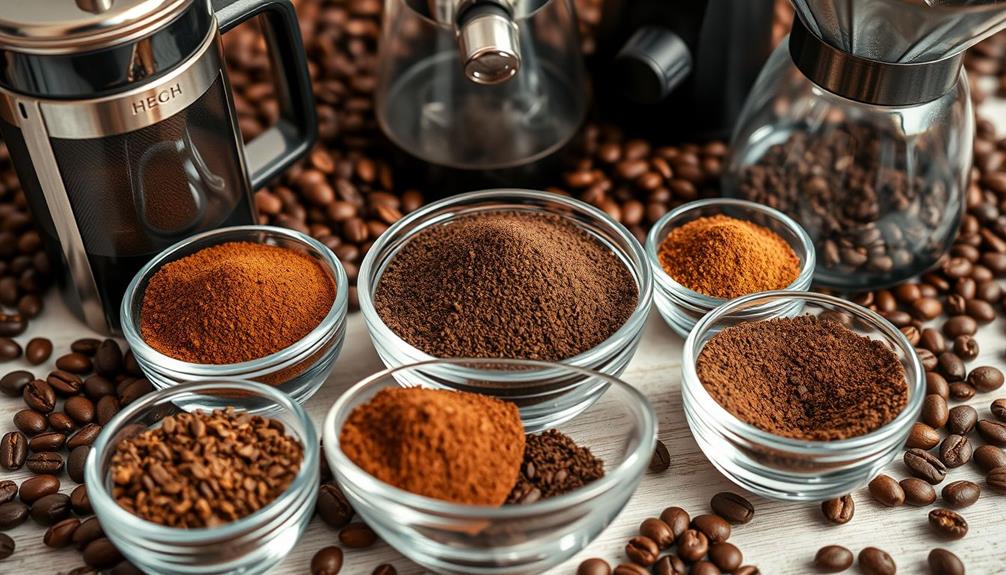
While you mightn't realize it, the grind size of your coffee beans plays a crucial role in how much flavor and nutrition you extract from your brew. Finer grinds generally lead to higher extraction rates of bioactive compounds, boosting both caffeine content and antioxidant activity.
For instance, when you brew espresso or use an Aeropress, the finer grind size enhances the release of soluble compounds, resulting in a more flavorful and nutrient-rich cup compared to coarser grinds used in the French press.
It's essential to match your grind size to your brewing method. Quick brewing styles like espresso require finer grinds for maximum extraction, while longer methods like French press benefit from coarser grinds to avoid bitterness.
If you're inconsistent with your grind size, you risk uneven extraction, which can lead to a lack of uniformity in flavor and nutritional content. For example, a finely ground espresso shot might yield around 63 mg of caffeine, while coarsely ground French press coffee offers about 30 mg.
Differences in Extraction Techniques

Various brewing methods can drastically alter the extraction of bioactive compounds in your coffee, affecting both flavor and nutritional content. When you choose a brewing technique, you influence the levels of compounds like caffeoylquinic acids (CQAs) and the overall antioxidant activity in your cup.
- The V60 method yields the highest CQAs at 124.9 mg/100 mL.
- Cold brew has a unique extraction profile due to its prolonged steeping time.
- Factors like water temperature and grind size play critical roles in your coffee's final flavor profile.
Research shows that the order of effectiveness for extracting desirable compounds is V60 > tubruk > cold brew. The V60 method not only enhances the extraction of CQAs but also demonstrates greater α-glucosidase inhibitory activity at 51.30%, compared to other methods.
Cold brew, while popular for its smoothness and lower acidity, results in a caffeine content of 74 mg per 150 mL cup, which varies from other brewing methods.
Comparison of Brewing Devices
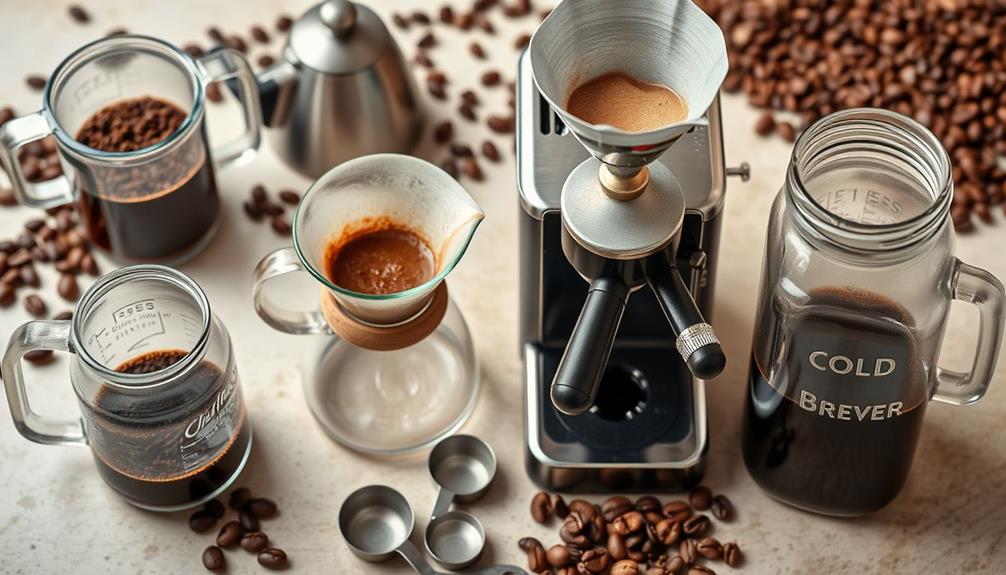
Choosing the right brewing device can greatly impact your coffee experience, from flavor to nutritional content. Different brewing methods yield varying levels of caffeine and bioactive compounds.
For instance, the Aeropress stands out with a remarkable polyphenol content of 191.29 g gallic acid/L, considerably higher than the French press, which measures at 133.90 g gallic acid/L. If you prefer a concentrated cup, espresso machines deliver a powerful brew in just 13 seconds, boasting higher mineral content, like calcium.
On the other hand, cold brew methods, though time-consuming, offer a smooth flavor profile and can extract high caffeine levels when using a favorable coffee-to-water ratio.
The V60 method shines in preserving bioactive compounds, achieving a notable caffeoylquinic acids (CQAs) content of 124.9 mg/100 mL. Meanwhile, the French press, with its metal filter, enhances flavor richness but risks over-extraction, which could diminish the health benefits of your coffee.
Antioxidant Activity in Coffee

Antioxidant activity is an essential aspect of coffee that influences both its health benefits and flavor profile. Different brewing methods greatly impact this activity, making your choice imperative.
For instance, the Aeropress boasts the highest antioxidant inhibition at 42%, while the French press lags behind at 31%. This difference is primarily due to the total polyphenol content, which is highest in Aeropress brews at 191.29 g gallic acid/L, compared to 133.90 g in French press options.
When you consider brewing methods, note these key factors:
- Extraction time: Longer brewing times can lead to reduced antioxidant preservation.
- Brewing temperature: Lower temperatures, like those in cold brew, help retain bioactive compounds.
- Method efficiency: Techniques like V60 minimize oxidation, enhancing antioxidant activity.
Cold brew is particularly effective due to its low temperature and prolonged steeping, allowing it to retain bioactive compounds, including antioxidants.
Ultimately, being mindful of your brewing methods can elevate both your coffee consumption experience and its nutritional benefits.
Health Implications of Brewing Choices
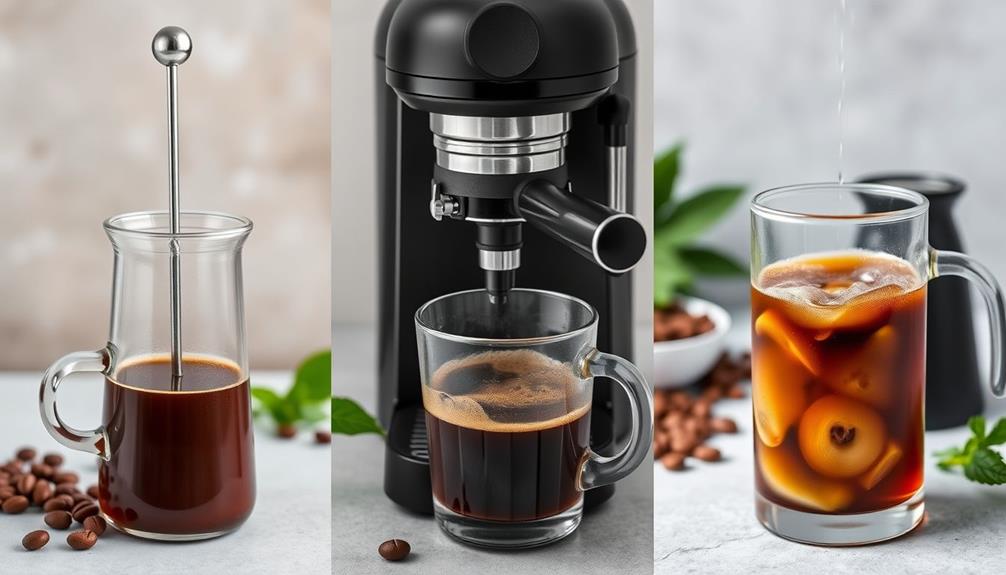
When it comes to your daily coffee ritual, the brewing method you select can profoundly affect your health. Different brewing methods influence the mineral content of your coffee. For example, espresso boasts higher calcium levels compared to drip coffee, which can enhance your dietary intake of vital nutrients.
If you're looking for the best antioxidant activity, the Aeropress method shines with a 42% inhibition rate, helping combat oxidative stress and potentially reducing the risk of chronic diseases.
Additionally, the V60 method stands out by providing the highest levels of caffeoylquinic acids (CQAs), which support glucose metabolism and may lower your risk of type 2 diabetes. Regularly enjoying coffee made via methods like cold brew can also deliver significant daily intakes of bioactive compounds, maximizing your health benefits.
However, it's crucial to stick to the recommended limits—three cups for V60 and five for cold brew—to fully enjoy these perks.
Incorporating various brewing methods not only enhances flavor but also guarantees you're reaping the benefits of minerals and biological compounds that contribute to your overall well-being. Choose wisely!
Frequently Asked Questions
How Does Brewing Method Affect Coffee?
Brewing method affects coffee by altering flavor, aroma, and strength. Each technique extracts different compounds, so whether you prefer a rich espresso or a smooth cold brew, your choice influences your coffee experience greatly.
What Type of Coffee Brewing Is Healthiest?
Imagine sipping a cup of coffee rich in antioxidants. If you're seeking the healthiest brew, try the Aeropress. Its quick extraction maximizes polyphenols and flavor, making it a top choice for health-conscious coffee lovers.
How the Different Processing Methods Affect the Flavor of Coffee?
Different processing methods shape coffee's flavor distinctly. You'll find washed coffees are cleaner and brighter, while natural ones burst with fruity sweetness. Honey-processed beans strike a balance, offering a unique, syrupy taste that's hard to resist.
How Do Different Brewing Times Affect the Level of Caffeine Concentration of Black Coffee?
Shorter brewing times yield less caffeine, while longer extractions boost concentration. You'll find espresso packs a punch in mere seconds, whereas cold brew, with its lengthy process, delivers a rich, caffeinated experience.
Conclusion
In the grand tapestry of coffee brewing, each method weaves its own unique flavor and nutritional thread. By understanding how brewing techniques influence caffeine levels, antioxidants, and overall health benefits, you can tailor your coffee ritual to suit your needs. Whether you prefer a bold espresso or a smooth pour-over, remember that every cup is a chance to savor not just the taste, but the potential health perks that come with it. Enjoy your coffee journey!
In the vast and diverse world of coffee, coffee alternatives, and tea, Olivia has found her calling. As an author and a dedicated coffee and tea aficionado, her work for Cappuccino Oracle reflects her profound love and understanding of the intricate complexities found within these beverages. Olivia’s passion for the subject serves as both a catalyst for her creativity and a connection point with her audience.
Olivia’s appreciation for coffee, coffee alternatives, and tea blossomed at an early age. She discovered that these beverages invigorated her senses and stimulated her creative spirit. From the nuanced flavors of single-origin roasts to the captivating narratives intertwined with coffee, coffee alternatives, and tea trade and culture, Olivia found an unlimited source of inspiration in her daily cup.
Her love for these beverages and her talent for storytelling eventually converged at Cappuccino Oracle. As an author, Olivia’s mission is to illuminate the intricate tapestry that makes up the world of coffee, coffee alternatives, and tea. Her articles span a diverse range of topics, encompassing everything from the unique flavors of different brews to the sociocultural history intertwined with their cultivation and consumption.
-

 Coffee Basics3 weeks ago
Coffee Basics3 weeks ago10 Potential Health Risks of Single-Serve Coffee Pods and How to Mitigate Them
-

 Coffee Basics3 weeks ago
Coffee Basics3 weeks agoCaffeine Content Comparison: Nespresso Vs. Traditional Coffee Vs. Energy Drinks
-

 Coffee Basics2 weeks ago
Coffee Basics2 weeks agoYerba Mate: The South American Superfood and Its Health Benefits
-

 Coffee Basics2 weeks ago
Coffee Basics2 weeks agoThe Impact of Coffee on Digestive Health: What Science Says
-

 Coffee Basics3 weeks ago
Coffee Basics3 weeks agoCelebrity Coffee Habits: Insights From TV and Movie Stars
-

 Coffee Basics3 weeks ago
Coffee Basics3 weeks agoSoft Drinks and Medical Tests: What You Need to Know
-

 Coffee Basics2 weeks ago
Coffee Basics2 weeks agoHerbal Teas for Every Occasion: From Relaxation to Romance
-

 Coffee Basics3 weeks ago
Coffee Basics3 weeks agoMaximizing the Shelf Life of Your Matcha: Storage Tips and Tricks































